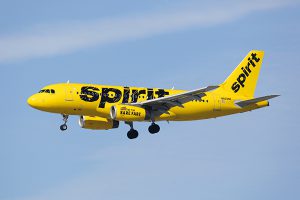Spirit Airlines Inc is now dancing with only one suitor.
A high-stakes shareholder vote over the low-cost carrier’s proposed merger with Frontier Group Holdings Inc appeared to come down to the wire, with Spirit pausing the proceedings at midday to allow for a few extra hours of negotiations. In the end, despite the additional time and four earlier delays in setting a date for the vote, Spirit failed to convince enough of its investors that a Frontier merger was their best option. Spirit will now continue discussions with JetBlue Airways Corp, which has made repeated, increasingly lucrative offers for the airline but been rebuffed on antitrust concerns.
It’s highly unusual for the subject of a bidding war to call off a deal without having another one lined up. In this case, the limbo most likely reflects how hard Spirit fought for the Frontier deal, down to every last vote and every possible minute. At some point, management will have to answer for why it was so loyal to a Frontier deal that shareholders were signaling they didn’t want. The shared history between Spirit and Frontier hasn’t gone unnoticed. William Franke, Frontier’s chairman and the managing partner of its largest shareholder, private equity firm Indigo Partners, previously served as the head of Spirit’s board and played a key role in turning the airline around.
Should Spirit now reach a deal with JetBlue, its executives will face the awkward task of selling a transaction that they have consistently branded as a virtual impossibility from a regulatory standpoint. Spirit’s concerns about JetBlue’s ability to win antitrust approval are well founded: JetBlue is concurrently fighting a Department of Justice lawsuit over its marketing alliance with American Airlines Group Inc, and its plan to do away with the cramped seating and bare-bones service that Spirit is known for suggests higher operating costs and thus ultimately higher fares for consumers.
But the Frontier merger wasn’t likely to sail through the antitrust process either, particularly amid the recent political scrutiny of widespread flight delays and cancellations. Money has a way of soothing investors’ fears over regulatory uncertainty, and JetBlue has always been willing to offer more than Frontier. JetBlue’s most recent proposal called for the airline to pay $33.50 a share in cash plus possible additional payouts through a so-called ticking fee mechanism that compensates shareholders for a long delay in the regulatory approval process.
Losing the Spirit deal will sting, but Frontier will likely be just fine. If Spirit does agree to sell itself to JetBlue, the process will take a long time.
—Bloomberg
 The Gulf Time Newspaper One of the finest business newspapers in the UAE brought to you by our professional writers and editors.
The Gulf Time Newspaper One of the finest business newspapers in the UAE brought to you by our professional writers and editors.
